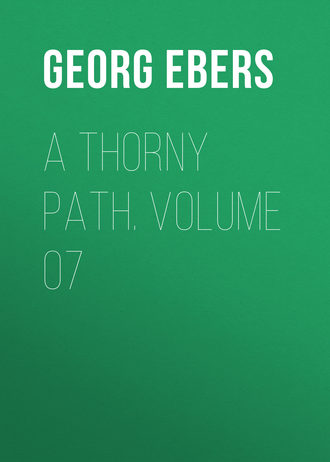
Georg Ebers
A Thorny Path. Volume 07
Here he paused, gazing meditatively into vacancy, and then asked the girl, who had listened intently:
"Were you never haunted by a word so that you could not be rid of it?"
"Oh, yes," cried Melissa; "a striking rhythm in a song, or a line of poetry—"
Caracalla nodded agreement, and went on more vehemently: "That is what I experienced at the words, 'You have murdered your brother!' I not only heard them now and then with my inward ear, but incessantly, like the dreary hum of the flies in my camp-tent, for hours at a time, by day and by night. No fanning could drive these away. The diabolical voice whispered loudest when Geta had done anything to vex me; or if things had been given him which I did not wish him to have. And how often that happened! For I—I was only Bassianus to my mother; but her youngest was her dear little Geta.
"So the years passed. We had, while still quite young, our own teams in the circus. One day, when we were driving for a wager-we were still boys, and I was ahead of the other lads—the horses of my chariot shied to one side. I was thrown some distance on the course. Geta saw this. He turned his horses to the right where I lay. He drove over his brother as he would over straw and apple-parings in the dust; and his wheel broke my thigh. Who knows what else it crushed in me? One thing is certain— from that date the most painful of my sufferings originated. And he, the mean scoundrel, had done it intentionally. He had sharp eyes. He knew how to guide his steeds. He had never driven his wheel over a hazel-nut in the sand of the arena against his will; and I was lying some distance from the driving course."
Caesar's eyelids blinked spasmodically as he uttered this accusation, and his very glance revealed the raging fire that was burning in his soul. Melissa's sad cry of:
"What terrible suspicion!" he answered with a short, scornful laugh and the furious assertion:
"Oh, there were friends enough who informed me what hope Geta had founded on this act of treachery. The disappointment made him irritable and listless, when Galenus had succeeded in curing me so far that I was able to throw away my Crutch; and my limp—at least so they tell me—is hardly perceptible."
"Not at all, most certainly not at all," Melissa sympathetically assured him. He, however, went on:
"Yet what I endured meanwhile!—and while I passed so many long weeks of pain and impatience on a couch, the words my mother had said about the brother whom I murdered rang constantly in my ears as though a reciter were engaged by day and night to reiterate them.
"But even this passed away. With the pain, which had spoiled many good hours for me, the quiet had brought me something more to the purpose- thoughts and plans. Yes, during those peaceful weeks the things my father and tutor had taught me became clear and real for the first time. I realized that I must become energetic if I meant ever to be a thorough sovereign. As soon as I could use my foot again I became an industrious and docile pupil under Cilo. From a child up to the time of this cruel experience, my youthful heart had clung to my nurse. She was a Christian from my father's African home—I knew she loved me best on earth. My mother knew of no higher destiny than that of being the Domna,—[Domna, lady or mistress, in corrupt Latin. Hence her name of Julia Domna] the lady of the soldiers, the mother of the camp, and the lady philosopher among the sages. What she gave me in the way of love was but copper alms. She threw golden solidi of love into Geta's lap in lavish abundance. And her sister and her nieces, who often lived with us, treated me exactly as she did. They were distantly civil, or they shunned me; but my brother was their spoiled plaything. I was as incapable as Geta was master of the art of stealing hearts; but in my childhood I needed none of them: for, if I wished for a kind word, a sweet kiss, or the love of a woman, my nurse's arms were open to me. Nor was she an ordinary woman. As the widow of a tribune who had fallen in my father's service, she had undertaken to attend on me. She loved me as no one else ever did. She was also the only person whom I would willingly obey. I came into the world full of wild instincts, but she knew how to tame them kindly. My aversion to my brother was the one thing she checked but feebly, for he was a thorn in her side too. I learned this when she, who was so gentle, explained to me, with asperity in her tone, that there was but one God in heaven, and on earth but one emperor, who should govern the world in his name. She also imparted these convictions to others, and this turned to her disadvantage. My mother parted us, and sent her back to her African home. She died soon after." He was silent, and gazed pensively into vacancy; soon, however, he collected his thoughts and said, lightly:
"Well, I became Cilo's diligent pupil."
"But," asked Melissa, "did you not say that at one time you attempted his life?"
"I did so," replied Caracalla darkly; "for a moment arrived when I cursed his teaching, and yet it was certainly wise and well meant. You see, child, all of you who go through life humbly and without power are trained to submit obediently to the will of Heaven. Cilo taught me to place my own power, and the greatness of the realm which it would be incumbent on me to reign over, above everything, even above the gods. It was impressed upon you and yours to hold the life of another sacred; to us, our duty as the sovereign transcends this law. Even the blood of a brother must flow if it is for the good of the state intrusted to us. My nurse had taught me that being good meant doing unto others as we would be done by; Cilo cried to me: 'Strike down, that you may not be struck down—away with mercy, if the welfare of the state is threatened!' And how many hands are raised against Rome, the universal empire, which I rule over! It needs a strong hand to keep its antagonistic parts together. Otherwise it would fall apart like a bundle of arrows when the string that bound them is broken. And I, even as a boy, had sworn to my father, by the Terminus stone in the Capitol, never to abandon a single inch of his ground without fighting for it. He, Severus, was the wisest of the rulers. Only the blind love for his second son, encouraged by the women, caused him to forget his moderation and prudence. My brother Geta was to reign together with me over the empire, which ought to have been mine alone as the first-born. Every year festivals were kept, with prayers and sacrifices, to the "love of the brothers." You have perhaps seen the coins, which show us hand in hand, and have on them the inscription, 'Eternal union'!
"I in union—I hand in hand with the man I most hated under the sun! It almost maddened me only to hear his voice. I would have liked best of all to spring at his throat when I saw him with his learned fellows squandering their time. Do you know what they did? They invented the names by which the voices of different animals were to be known. Once I snatched the pencil out of the hand of the freedman as he was writing the sentences, 'The horse neighs, the pig grunts, the goat bleats, the cow lows, the sheep baas.' 'He, himself,' I added, 'croaks like a hoarse jay.'
"That I should share the government with this miserable, faint-hearted, poisonous nobody could never be,—this enemy, who, when I said 'Yes,' cried 'No!' Who frustrated all my measures,—it was impossible! It would have caused the destruction of the state, as certainly as it was the unfairest and unwisest of the deeds of Severus, to place the younger brother as co-regent with the first-born, the rightful heir to the throne. I, whom my father had taught to watch for signs, was reminded every hour that this unbearable position must come to an end.
"After the death of Severus, we lived at first close to one another in separate parts of the same palace like two lions in a cage across which a partition has been erected, so that they may not reciprocally mangle each other.
"We used to meet at my mother's.
"That morning my mastiff had bitten Geta's wolfhound and killed him, and they had found a black liver in the beast he had sent for sacrifice. I had been informed of this. Destiny was on my side. This indolent inactivity must be brought to a close. I myself do not know how I felt as I mounted the steps to my mother's rooms. I only remember distinctly that a demon cried continually in my ear, 'You have murdered your brother!' Then I suddenly found myself face to face with him. It was in the empress's reception-room. And when I saw the hated flat-shaped head so close to me, when his beardless mouth with its thick underlip smiled at me so sweetly and at the same time so falsely, I felt as if I again heard the cry with which he had cheered on his horse. And I felt . . . I even felt the pain-as if he broke my thigh again with his wheel. And at the same time a fiend whispered in my ear: 'Destroy him, or he will kill you, and through him Rome will perish!'
"Then I seized my sword. In his odious, peevish voice he said something —I forget what nonsense—to me. Then it appeared to me as if all the sheep and goats over which he had squandered his time were bleating at me. The blood rushed to my head. The room spun round me in a circle. Black spots on a red ground danced before my eyes.
"And then—What flashed in my right hand was my own naked sword! I neither heard nor said anything further. Nor had I planned, nor ever thought of, what then occurred. . . . But suddenly I felt as if a mountain of oppressive lead had fallen from my breast. How easily I could breathe again! All that had just before turned round me in a mad, whirling dance stood still. The sun shone brightly in the large room; a shaft of light, showing dancing dust, fell on Geta. He sank on his knees close to me, with my sword in his breast. My mother made a fruitless effort to shield him. His blood trickled over her hand. I can still see every ring on those slender, white fingers. I also remember distinctly how, when I raised my sword against him, my mother rushed in between us to protect her favorite. The sharp blade, as she tried to seize it, accidentally grazed her hand—I know not how—only the skin was slightly cut. Yet what a scream she gave over the wound which the son had given his mother! Julia Maesa, her daughter Mammara, and the other women, rushed in. How they exaggerated! They made a river out of every drop of blood.
"So the dreadful deed was done; and yet, had I let the wretch live, I should have been a traitor to Rome, to myself, and to my father's life's work. That day, for the first time, I was ruler of the world. Those who accuse me of fratricide no doubt believe themselves to be right. But they certainly are not. I know better. You also know now with me that destiny, and not I, struck Geta out from among the living."
Here he sat for some time in breathless silence. Then he asked Melissa:
"You understand now how I came to shed my brother's blood?"
She started, and repeated gently after him: "Yes, I understand it."
Deep compassion filled her heart, and yet she felt she dare not sanction what she had heard and deplored. Torn by deep and conflicting feelings she threw back her head, brushed her hair off her face, and cried: "Let me go now; I can bear it no longer!"
"So soft-hearted?" asked he, and shook his head disapprovingly. "Life rages more wildly round the throne than in an artist's home. You will have to learn to swim through the roaring torrent with me. Believe me, even enormities can become quite commonplace. And, besides, why does it still shock you when you yourself know that it was indispensable?"
"I am only a weak girl, and I feel as if I had witnessed these fearful deeds, and had to bear the terrible blood-guiltiness with you!" broke from her lips.
"That is what you must and shall do! It is to that end that I have confided to you what no one else has ever heard from my mouth!" cried Caracalla, his eyes flashing more brightly. She felt as though this cry called her from her slumbers and revealed the precipice to which she had strayed in her sleepwalking.
When Caracalla had begun telling her of his youth, she had only listened with half an ear; for she could not forget Berenike's rescuing ship. But soon his confessions completely attracted her attention, and the lament of this powerful man on whom so many injuries and wrongs had fallen, who even in childhood had been deprived of the happiness of a mother's love, had touched her tender heart. That which was afterward told to her she had identified with her own humble life; she heard with a shudder that it was to the malice of his brother that this unhappy being owed the injury which, like a poisonous blight, had marred for him all the joys of existence, while she owed all that was loveliest and best in her young life to a brother's love.
The grounds on which Caracalla had based the assertion that destiny had compelled him to murder Geta appeared to her young and inexperienced mind as indisputable. He was only the pitiable victim of his birth and of a cruel fate. Besides, the humblest and most sober-minded can not resist the charm of majesty; and this hapless man, who had honored Melissa with his confidence, and who had assured her so earnestly that she was of such importance to him and could do so much for him, was the ruler of the universe.
She had also felt, after Caesar's confession, that she had a right to be proud, since he had thought her worthy to take an interest in the tragedy in the imperial palace, as if she had been a member of the court. In her lively imagination she had witnessed the ghastly act to which he—as she had certainly believed, even when she had replied to his question—had been forced by fate.
But the demand which had followed her answer now recurred to her. The picture of Diodoros, which had completely vanished from her thoughts while she had been listening, suddenly appeared to her, and, as she fancied, he looked at her reproachfully.
Had she, then, transgressed against her betrothed?
No, no, indeed she had not!
She loved him, and only him; and for that very reason, her upright judgment told her now, that it would be sinning against her lover to carry out Caracalla's wish, as if she had become his fellow-culprit, or certainly the advocate of the bloody outrage. She could think of no answer to his "That is what you must and shall do!" that would not awaken his wrath. Cautiously, and with sincere thanks for his confidence in her, she begged him once more to allow her to leave him, because she needed rest after such a shock to her mind. And it would also do him good to grant himself a short rest. But he assured her he knew that he could only rest when he had fulfilled his duty as a sovereign. His father had said, a few minutes before he drew his last breath:
"If there is anything more to be done, give it me to do," and he, the son, would do likewise.
"Moreover," he concluded, "it has done me good to bring to light that which I had for so long kept sealed within me. To gaze in your face at the same time was, perhaps, even better physic."
At this he rose and, seizing the startled girl by both hands, he cried:
"You, child, can satisfy the insatiable! The love which I offer you resembles a full bunch of grapes, and yet I am quite content if you will give me back but one berry."
At the very commencement, this declaration was drowned by a loud shout which rang through the room in waves of sound.
Caracalla started, but, before he could reach the window, old Adventus rushed in breathless; and he was followed, though in a more dignified manner, with a not less hasty step and every sign of excitement, by Macrinus, the prefect of the praetorians, with his handsome young son and a few of Caesar's friends.
"This is how I rest!" exclaimed Caracalla, bitterly, as he released Melissa's hand and turned inquiringly to the intruders.
The news had spread among the praetorians and the Macedonian legions, that the emperor, who, contrary to his custom, had not shown himself for two days, was seriously ill, and at the point of death. Feeling extremely anxious about one who had showered gold on them, and given them such a degree of freedom as no other imperator had ever allowed them, they had collected before the Serapeum and demanded to see Caesar. Caracalla's eyes lighted up at this information, and, excitedly pleased, he cried:
"They only are really faithful!"
He asked for his sword and helmet, and sent for the 'paludamentum', the general's cloak of purple, embroidered with gold, which he never otherwise wore except on the field. The soldiers should see that he intended leading in future battles.
While they waited, he conversed quietly with Macrinus and the others; when, however, the costly garment covered his shoulders, and when his favorite, Theocritus, who had known best how to support him during his illness, offered him an arm, he answered imperiously that he required no assistance.
"Nevertheless, you should, after so serious an attack—" the physician in ordinary ventured to exhort him; but he interrupted him scornfully, and, glancing toward Melissa, exclaimed:
"Those little hands there contain more healing power than yours and the great Galenus's put together."
Thereupon he beckoned to the young girl, and when she once more besought his permission to go, he left the room with the commanding cry, "You are to wait!"
He had rather far to go and some steps to mount in order to reach the balcony which ran round the base of the cupola of the Pantheon which his father had joined to the Serapeum, yet he undertook this willingly, as thence he could best be seen and heard.
A few hours earlier it would have been impossible for him to reach this point, and Epagathos had arranged that a sedan-chair and strong bearers should be waiting at the foot of the steps; but he refused it, for he felt entirely restored, and the shouts of his warriors intoxicated him like sparkling wine.
Meanwhile Melissa remained behind in the audience-chamber. She must obey Caesar's command. Yet it frightened her; and, besides, she was woman enough to feel it as an offense that the man who had assured her so sincerely of his gratitude, and who even feigned to love her, should have refused so harshly her desire to rest. She foresaw that, as long as he remained in Alexandria, she would have to be his constant companion. She trembled at the idea; yet, if she tried to fly from him, all she loved would be lost. No, this must not be thought of! She must remain.
She threw herself on a divan, lost in thought, and as she realized the confidence of which the unapproachable, proud emperor had thought her worthy, a secret voice whispered to her that it was certainly a delightful thing to share the overwhelming agitations of the highest and greatest. And was he then really bad, he who felt the necessity of vindicating himself before a simple girl, and to whom it appeared so intolerable to be misjudged and condemned even by her? Besides being the emperor and a suffering man, Caracalla had also become her wooer. It never once entered her mind to accept him; but still it flattered her extremely that the greatest of men should declare his love for her. Why, then, need she fear him? She was so important to him, she could do so much for him, that he would surely take care not to insult or offend her. This modest child, who till quite lately had trembled before her own father's temper, now, in the consciousness of Caesar's favor, felt herself strong to triumph over the wrath and passions of the most powerful and most terrible of men. In the mean time she dared not risk confessing to him that she was another's bride, for that might determine him to let Diodoros feel his power. The thought that the emperor could care about her good opinion greatly pleased her; it even had the effect of raising the hope in her inexperienced mind that Caracalla would moderate his passion for her sake—when old Adventus came into the room.







